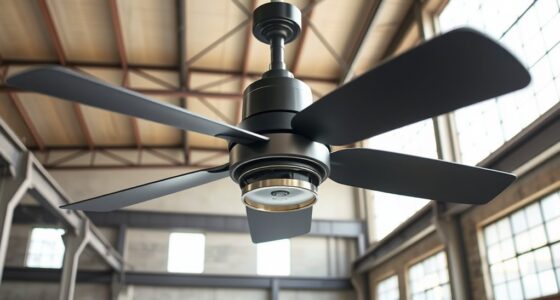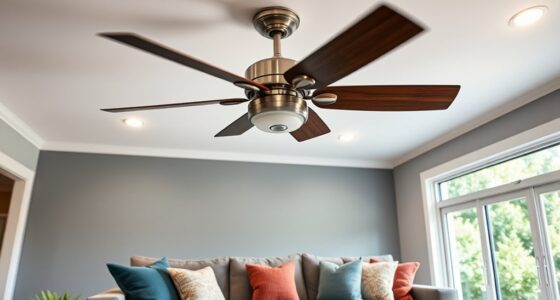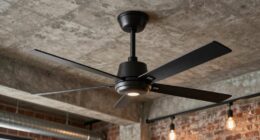I've found the 15 best RV air conditioner heater combos that promise ultimate comfort on the road. These units, like the TOSOT GO Cool at 15,000 BTUs, combine both heating and cooling efficiently. They regulate temperatures quickly, making them perfect for unexpected weather. I also love how user-friendly many of them are, featuring remote controls and low noise operation. You can save a bundle on fuel too! Consider factors like BTU capacity and insulation for your specific RV. Stick around, and you'll uncover more tips on choosing the perfect combo for your travels. These versatile systems aren’t just limited to RVs—many of the best window AC heater combos also offer impressive performance for compact spaces, providing year-round comfort in a single unit. When selecting the right model, pay attention to energy efficiency ratings, as this can significantly impact long-term savings. With the right unit, you’ll be ready to tackle any season without breaking the bank or sacrificing convenience.
Key Takeaways
- Look for units with 8500 to 15,000 BTUs to ensure effective heating and cooling for various RV sizes up to 130 square feet.
- Consider models featuring inverter technology for reduced energy consumption and improved efficiency, leading to significant fuel savings.
- Select air conditioners with quick temperature regulation, allowing adjustments within 8-10 minutes for immediate comfort.
- Prioritize low noise operation models, ideally under 50 dB, to maintain a peaceful environment during travel.
- Evaluate installation requirements and choose units with pre-connected power wires for simplified setup while considering weight and complexity.
RV Air Conditioner with Heat 12V Universal Rooftop AC Unit
If you're an RV enthusiast who values comfort and efficiency, the RV Air Conditioner with Heat 12V Universal Rooftop AC Unit is an excellent choice for you. This 8500BTU unit is a game-changer, offering both heating and cooling modes to keep your space just right, no matter the season. I love how it quickly regulates temperature in as little as eight minutes, transforming my RV into a cozy retreat or a cool escape. Plus, it's powered by the vehicle battery or external power, which helps save on fuel costs—up to $6,000 annually! With its low noise operation and durable construction, it's a reliable companion for any adventure. Installation is a breeze, making it perfect for anyone looking to enhance their RV experience.
Best For: RV enthusiasts seeking a reliable and efficient heating and cooling solution for their travels.
Pros:
- Cost-effective operation that can save up to $6,000 annually in fuel costs.
- Quick temperature regulation that cools or heats the space in just 8 minutes.
- Low noise operation at less than 50 dBs, ensuring a tranquil environment.
Cons:
- Requires access to a vehicle battery or external power source for operation.
- Installation may still be challenging for those without technical skills despite provided instructions.
- Performance may vary based on the insulation and size of the RV.
8500 BTU RV Air Conditioner with Heat (Universal Rooftop AC Unit)
The 8500 BTU RV Air Conditioner with Heat is perfect for RV enthusiasts who want reliable climate control in a compact design. This universal rooftop AC unit not only cools but also heats, making it ideal for various vehicles like RVs, vans, and trailers. With a cooling capacity of 9,000 BTUs and heating of 4,000 BTUs, it efficiently covers spaces up to 130 square feet. I appreciate how quickly it can cool a trailer in under 10 minutes. Plus, its inverter technology keeps energy consumption low, potentially saving me up to $6,000 a year in fuel costs. Equipped with user-friendly features like remote control and low noise operation, this unit truly enhances comfort on the road.
Best For: RV enthusiasts seeking reliable climate control in a compact and efficient rooftop AC unit.
Pros:
- Fast cooling and heating capability, cooling spaces in under 10 minutes.
- Energy-efficient inverter technology that can save up to $6,000 annually in fuel costs.
- User-friendly features such as remote control and low noise operation below 45dB.
Cons:
- Installation may require professional help for those unfamiliar with RV systems.
- Limited coverage for spaces over 130 square feet, which may not suit larger vehicles.
- Initial investment cost may be higher compared to basic AC units without heating features.
12V RV Air Conditioner with Heat (8.5K BTU Universal Rooftop AC Unit)
For those seeking efficient climate control in their RV or trailer, the 12V RV Air Conditioner with Heat (8.5K BTU Universal Rooftop AC Unit) stands out as an ideal solution. With a cooling capacity of 9,000 BTUs and heating at 4,000 BTUs, it effectively covers up to 130 square feet. I love how it cools my 29-foot trailer in under 10 minutes! Plus, its inverter technology not only reduces energy consumption but also keeps noise levels to a whisper at 45dB or less. The remote control and LED display make adjustments a breeze, while the durable ABS material guarantees longevity. Although some users note minor issues with the control panel and fan noise, overall, it's a solid choice for comfort on the road.
Best For: RV owners and travelers looking for an efficient and compact climate control solution for small spaces.
Pros:
- Long pre-connected power wires for easy installation.
- Low noise operation at 45dB or less for a quieter environment.
- Fast cooling capability, effectively cooling a 29-foot trailer in under 10 minutes.
Cons:
- Power wires may present routing issues during installation.
- Some users report fan noise even on low settings.
- Control panel temperature display is only in Celsius, which may be inconvenient for some users.
TOSOT GO Cool RV Air Conditioner 15000 BTU
Looking for a powerful yet efficient air conditioner for your RV? The TOSOT GO Cool RV Air Conditioner packs a punch with a cooling capacity of 15,000 BTU and a heating capacity of 12,000 BTU. It easily covers up to 600 sq ft, making it perfect for RVs between 16 to 24 feet long. With its non-ducted design, I found installation straightforward, fitting standard rooftop vent openings. Plus, the WiFi control via the Gree+ app means I can manage it right from my phone. I love that it operates quietly at just 52 dB and handles temperatures from 23°F to 115°F. Overall, it's a fantastic choice for comfort on the road.
Best For: Those seeking an efficient and powerful air conditioning solution for RVs between 16 to 24 feet long. This unit provides reliable cooling performance while maintaining energy efficiency, making it ideal for long trips or extended stays. It’s designed to work seamlessly with some of the best generators for RV air conditioners, ensuring consistent operation even when you’re off the grid. With its compact size and durable construction, it’s a perfect fit for adventurous travelers looking for both comfort and convenience.
Pros:
- WiFi Control: Easily manage the air conditioner from your smartphone using the Gree+ app.
- Quiet Operation: Operates at a noise level of just 52 dB, ensuring a peaceful environment.
- Easy Installation: Designed for straightforward installation in standard rooftop vent openings.
Cons:
- Weight: Weighing 65.9 pounds, some users may require assistance during installation.
- Energy Consumption: With an annual energy consumption of 4526 Kilowatt Hours, it may impact energy usage.
- Limited Coverage: Best suited for RVs up to 600 sq ft, which may limit use in larger vehicles.
TOSOT GO COOL RV Air Conditioner (15000 BTU)
If you're seeking a powerful and efficient solution for cooling and heating your RV, the TOSOT Go Cool RV Air Conditioner offers an impressive 15,000 BTU cooling capacity paired with a 12,000 BTU heating capability. This unit is perfect for RVs between 16 to 24 feet, effectively covering spaces up to 600 square feet. With a high-efficiency EER rating of 8.5, it operates quietly, making just 48 dB on low. I appreciate the smart WiFi control via the Gree+ app, allowing me to manage settings remotely. Installation is straightforward, though I've heard some users face minor challenges. Overall, the TOSOT Go Cool provides comfort in extreme temperatures, making my travels much more enjoyable.
Best For: Those seeking an efficient and powerful air conditioning solution for RVs between 16 to 24 feet long.
Pros:
- High cooling and heating capacity (15,000 BTU cooling and 12,000 BTU heating) suitable for larger RVs.
- Quiet operation, with noise levels as low as 48 dB on low settings.
- Smart WiFi control via the Gree+ app allows for remote management of settings.
Cons:
- Some users report installation challenges, including missing parts and alignment issues.
- Reliance on WiFi for app functionality may be problematic in remote areas.
- Not compatible with RVs that have ductwork, limiting installation options.
12 V RV Air Conditioner with Heat Universal Roof Top AC Unit
The 12V RV Air Conditioner with Heat Universal Roof Top AC Unit is perfect for those who frequently travel in trucks, trailers, or vans and need reliable climate control. With an impressive 8500 BTU capacity, this unit provides efficient heating and cooling in just 8 minutes. It's designed to be cost-effective, drawing power from your vehicle's battery or an external source, which can save you up to $6,000 annually on fuel costs. Plus, it operates quietly at less than 50 dBs, ensuring a peaceful environment. Made from high-quality ABS material, it's built to withstand rugged terrains and diverse climates. Installation is straightforward with a complete set of accessories included, making it a fantastic addition to any RV setup.
Best For: Travelers in trucks, trailers, or vans seeking efficient and reliable climate control for diverse conditions.
Pros:
- Cost-effective operation, significantly reducing fuel costs.
- Quick temperature regulation in just 8 minutes for immediate comfort.
- Durable construction with high-quality ABS material for long-lasting use.
Cons:
- Requires a reliable power source, which may not be available in all locations.
- Installation may be challenging for those without technical skills.
- Limited cooling capacity may not suffice for larger spaces or extreme heat conditions.
12V RV Air Conditioner with Heat Combo Unit
Need a reliable solution for year-round comfort in your RV? The 12V RV Air Conditioner with Heat Combo Unit is a game changer. With an impressive 8500 BTU capacity, it quickly cools or heats your space in as little as 8 minutes. Not only is it cost-effective, but it also runs off your vehicle's battery or external power, potentially saving you up to $6,000 annually on fuel costs. Plus, its low-noise operation keeps sound levels under 50 dBs, ensuring a peaceful atmosphere wherever you park. Built with durable ABS material, it withstands various terrains and conditions, making it perfect for motorhomes, trucks, and trailers. Installation is easy with included accessories, turning your vehicle into a cozy retreat in no time.
Best For: RV owners seeking an efficient and reliable air conditioning and heating solution for year-round comfort during travel and camping.
Pros:
- Cost-effective operation with potential savings on fuel costs up to $6,000 annually.
- Rapid temperature regulation that cools or heats the space in as little as 8 minutes.
- Low-noise performance keeps sound levels below 50 dBs, ensuring a peaceful environment.
Cons:
- Installation may require some technical skills, which could be challenging for some users.
- Limited to 12V power, which may not be compatible with all vehicles.
- Initial purchase cost may be higher compared to traditional AC units.
RV Roof Top 12V Air Conditioner with Heat Unit
For those seeking an efficient climate control solution, the RV Roof Top 12V Air Conditioner with Heat Unit stands out as a top choice. With its 8500 BTU capacity, this universal AC unit delivers both cooling and heating, making it perfect for various vehicles like vans and trailers. I love how it can regulate temperature in just 8 minutes, providing cool relief in the summer and cozy warmth during winter. It operates quietly, under 50 dBs, so it won't disrupt my adventures. Plus, it's designed with durable ABS material, ensuring it can withstand diverse conditions. Thanks to its cost-effective operation, I can save up to $6,000 annually, making it a smart investment for both short trips and long hauls.
Best For: Those who need an efficient and reliable climate control solution for their RVs, vans, and trailers during various weather conditions.
Pros:
- Cost-effective operation with potential savings of up to $6,000 annually.
- Quick temperature regulation, cooling or heating within 8 minutes.
- Quiet operation under 50 dBs for a peaceful travel experience.
Cons:
- Initial installation may require specific tools and expertise.
- Limited to 12V power sources, which may not be available in all locations.
- The 8500 BTU capacity may not be sufficient for larger RVs or trailers in extreme climates.
RecPro RV Air Conditioner (15K, Non-Ducted)
Designed specifically for campers and food truck operators, the RecPro RV Air Conditioner (15K, Non-Ducted) stands out with its impressive heat pump and cooling capabilities. With a low amp draw, this unit lets me run multiple appliances simultaneously without worrying about power consumption. I also appreciate its dehumidifying function, which helps reduce excess moisture and keeps the air comfortable year-round. Operating at just 55.4 decibels, it's quieter than a gentle rain—perfect for peaceful nights. Installation was straightforward; I had it set up in under two hours. Plus, the remote control offers convenient access to various settings. Overall, my experience with the RecPro has been excellent, and I highly recommend it for anyone needing dependable climate control on the road.
Best For: The RecPro RV Air Conditioner is best for campers, food truck operators, and RV enthusiasts seeking efficient and quiet climate control.
Pros:
- Low amp draw allows for simultaneous operation of multiple appliances without excessive power consumption.
- Quieter operation at 55.4 decibels ensures a peaceful environment, ideal for sleeping or relaxing.
- Easy installation process, often completed in under two hours, even for those without RV experience.
Cons:
- Some users found the unit heavy, requiring assistance for installation.
- Minor design flaws have been noted, though they are generally cosmetic and non-structural.
- Quality control issues have been reported by users, particularly in new RVs during installation.
10000 BTU RV Air Conditioner with Heat (24V)
The 10000 BTU RV Air Conditioner with Heat (24V) is perfect for those who want an efficient, all-in-one climate control solution while on the road. I love how it quickly regulates temperatures in just eight minutes, keeping me cool in summer and warm in winter. Plus, it can save up to $6,000 in fuel costs annually, which is a fantastic bonus for budget-conscious travelers.
What really impresses me is its low-noise operation, staying below 50 dBs, ensuring a peaceful environment whether at a campsite or on the move. Constructed from durable ABS material, it's built to last and easy to install with provided accessories. This unit transforms my RV into a cozy retreat, making every journey more enjoyable.
Best For: Budget-conscious travelers seeking an efficient and comfortable climate control solution for their RVs and campers.
Pros:
- Quick temperature regulation in just eight minutes for both cooling and heating needs.
- Low noise operation ensures a tranquil environment while traveling or camping.
- Durable construction with high-quality ABS material for long-lasting performance.
Cons:
- Requires 24V DC power, which may limit compatibility with some vehicles.
- Installation may require some technical skills, despite included instructions.
- Higher upfront cost compared to standard RV air conditioning units.
12V Van AC Unit RV Roof Air Conditioner Heater Combo
If you're looking for a reliable solution to keep your RV or vehicle comfortable in any climate, the 12V Van AC Unit RV Roof Air Conditioner Heater Combo stands out with its rapid temperature regulation. It cools or heats your space in as little as 8 minutes, making it perfect for quick changes in weather. Plus, it operates quietly at under 50 dBs, so you won't be disturbed while enjoying your travels. The installation is straightforward, thanks to the included accessories and detailed instructions. This unit is also cost-effective, drawing power from your vehicle's battery and potentially saving you up to $6,000 annually on fuel. With durable materials and positive customer feedback, this combo truly enhances your comfort on the road.
Best For: Those seeking a versatile and efficient cooling and heating solution for their RVs, trucks, or trailers during various adventures.
Pros:
- Quick temperature regulation: Cools or heats spaces in as little as 8 minutes.
- Quiet operation: Maintains noise levels under 50 dBs for a peaceful environment.
- Cost-effective: Can save up to $6,000 annually on fuel by drawing power from the vehicle battery.
Cons:
- Installation required: May require some DIY skills for proper setup.
- Dependent on battery: Performance may vary based on the vehicle's battery capacity.
- Limited warranty information: Warranty specifics need to be checked online, which may not be immediately accessible.
RV Air Conditioner 8188 BTU Non-Ducted 2-in-1 Rooftop Unit
For those looking to enhance comfort during their travels, the RV Air Conditioner 8188 BTU Non-Ducted 2-in-1 Rooftop Unit stands out as an ideal solution. This unit combines cooling and heating capabilities, making it perfect for any climate. With a cooling capacity of 8188 BTU and a heating capacity of 3412 BTU, it efficiently maintains a comfortable environment. Its non-ducted design guarantees easy installation across various RV models, while the seven adjustable vents provide 360° airflow for maximum comfort. I appreciate the quiet operation at just 45 decibels, which is perfect for restful nights. Plus, the unit's energy efficiency means I can enjoy comfort without draining my vehicle's battery. It's a reliable choice for any RV enthusiast.
Best For: RV enthusiasts seeking an efficient and versatile air conditioning solution for various climates.
Pros:
- Easy installation with a non-ducted design compatible with multiple RV models.
- Provides both cooling and heating capabilities, ensuring comfort in any season.
- Operates quietly at just 45 decibels, ideal for a peaceful sleeping environment.
Cons:
- Requires a significant power draw (30A-50A), which may limit use in smaller battery systems.
- The unit's weight (25 kg / 55.16 lbs) could make installation challenging for some users.
- The sunroof size requirement may not fit all RV models, restricting compatibility.
12V RV Air Conditioner Heater Combo (8500BTU)
Looking for an efficient way to keep your RV comfortable in any season? The Bailigo 12V RV Air Conditioner Heater Combo (8500 BTU) is a fantastic choice. It quickly cools or heats your space in just 8 minutes, making it perfect for summer trips or chilly winter nights. With its inverter compressor, you'll enjoy cost-effective cooling powered by your vehicle's battery, saving you up to $6,000 annually on fuel. Plus, its durable ABS material guarantees it withstands rugged environments while keeping noise levels below 50 dB. Installation is a breeze with included accessories and instructions. Whether you're camping or maneuvering through urban settings, this unit transforms your RV into a cozy haven, no matter where the road takes you.
Best For: RV owners seeking a reliable and efficient heating and cooling solution for diverse climates and terrains.
Pros:
- Cost-effective operation reduces fuel expenses by up to $6,000 annually.
- Quick heating and cooling capabilities in just 8 minutes for immediate comfort.
- Durable and noise-efficient design with low noise levels below 50 dB.
Cons:
- Installation may require professional assistance for some users unfamiliar with RV systems.
- Size may limit compatibility with smaller RVs or trailers.
- Dependence on battery power could limit use if the vehicle battery is low.
9200 BTU RV Air Conditioner Heater Combo
The 0 BTU RV Air Conditioner Heater Combo is an ideal choice for those who want a lightweight and energy-efficient solution for their recreational vehicles. While it doesn't generate cooling or heating on its own, it pairs perfectly with other systems to enhance comfort. I find it's especially useful in combination with a 9200 BTU unit, which can provide rapid temperature control in just 8 minutes. This combo allows for significant fuel savings and operates quietly, making it perfect for restful nights. Plus, its durable ABS material guarantees it withstands the rigors of travel. If you're looking to optimize your RV's comfort without adding excess weight, the 0 BTU option might just be the perfect fit for your adventures.
Best For: Those seeking an efficient and quiet temperature control solution for their RV, trailer, or other recreational vehicles.
Pros:
- Rapid temperature control in as little as 8 minutes for quick comfort.
- Dual functionality provides both cooling in summer and heating in winter.
- Low noise operation ensures a tranquil environment during travel or rest.
Cons:
- Requires a reliable power source to operate effectively.
- Installation may be challenging for those without technical skills.
- Initial investment cost may be higher compared to basic cooling solutions.
9000 BTU Camper AC Unit with Heat
Choosing a 0 BTU camper AC unit with heat is perfect for those who prioritize lightweight and energy-efficient solutions for their small spaces. This unit provides quick temperature regulation, cooling or heating your area in just 8 minutes. I love that it's powered by my vehicle battery or external power, saving me up to $6,000 in fuel costs each year. The low-noise operation, under 50 dBs, keeps my environment tranquil, which is essential during long hauls or while parked. Plus, its durable ABS material withstands impact and corrosion, ensuring longevity. With easy installation and versatility, it's ideal for various landscapes. This AC unit has truly transformed my vehicle into a comfortable oasis, no matter where the journey takes me.
Best For: Those seeking an efficient and compact cooling and heating solution for their RVs, trucks, or vans during travel or camping.
Pros:
- Cost-effective operation with potential fuel savings of up to $6,000 annually.
- Quick temperature regulation in as little as 8 minutes for immediate comfort.
- Durable ABS material ensures long-lasting performance against impact and corrosion.
Cons:
- Requires a reliable vehicle battery or external power source for operation.
- Installation may require some technical skills, depending on the vehicle.
- Limited cooling/heating capacity may not suffice for larger spaces.
Factors to Consider When Choosing an RV Air Conditioner Heater Combo

When I'm choosing an RV air conditioner heater combo, there are several key factors I consider. I look at the cooling and heating capacity, energy efficiency ratings, and how noisy the unit is. Plus, I think about installation complexity and the durability of materials to guarantee I'm making a smart investment.
Cooling and Heating Capacity
Considering the varying climates we might encounter while RVing, it's essential to understand cooling and heating capacities when selecting an air conditioner heater combo. The cooling capacity is typically measured in BTUs, and it's important to match this to your RV size. For smaller spaces, an 8,500 BTU unit may suffice, while larger RVs or trailers might require up to 15,000 BTUs for effective cooling.
On the heating side, many units provide around 4,000 BTUs, which helps keep things cozy during those chilly nights. I always guarantee that the unit I choose can adequately cover the intended space; for instance, a 9,000 BTU air conditioner can efficiently cool areas up to 130 square feet.
Quick temperature regulation is another feature I look for—some units can adjust the environment in as little as 8 to 10 minutes, which is fantastic when the weather changes unexpectedly. Finally, I prefer models with dual functionality, providing both heating and cooling to guarantee year-round comfort, regardless of where the road takes us. Having the right capacity makes all the difference in enjoying our RV adventures!
Energy Efficiency Ratings
After making certain I've got the right cooling and heating capacity for my RV, I always turn my attention to energy efficiency ratings. These ratings are essential because higher efficiency typically means better performance and lower energy consumption, which can save me a significant amount of money over time. I pay close attention to the Energy Efficiency Ratio (EER); a unit with an EER of 8.5 is far more efficient than one with an EER of 6.0.
When I can, I opt for models featuring inverter technology. These units adjust their operating frequency, leading to reduced energy consumption compared to traditional models. It's also worth noting that energy-efficient RV air conditioners and heaters can potentially save me up to $6,000 annually in fuel costs, which is a game changer for frequent travelers like me.
I also keep an eye on noise levels, as quieter units (under 50 dB) often incorporate advanced technology that optimizes power use. By prioritizing these energy efficiency ratings, I can make certain my RV stays comfortable while keeping my costs in check.
Noise Level Considerations
Evaluating noise levels is important for my comfort when choosing an RV air conditioner heater combo. I've found that most units operate within a range of 45 dB to 60 dB. Lower noise levels create a more tranquil environment, which is particularly significant during travel or rest. Many newer models use advanced technology to keep sound levels under 50 dB, making sure that I'm not disturbed, especially at night.
It's also essential to take into account how the unit's noise may vary between modes. Cooling functions typically generate more sound than heating, so I always check the noise profile for each setting. If I want a quieter experience, I lean toward units with inverter technology, as they adjust their frequency to operate more quietly in both cooling and heating modes.
In close quarters like my RV, sound can easily travel, making it important to select a model that maintains a peaceful atmosphere. By prioritizing noise levels, I can guarantee a comfortable journey without the distraction of excessive noise from my air conditioner heater combo.
Installation Complexity
Installing an RV air conditioner heater combo can often be more complicated than I initially expect. I've found that the installation complexity can vary widely between units. Some models are designed for easy DIY installation, while others might require professional help, especially if they're heavier or have specific mounting needs. When I choose a unit, I always check if it comes with a complete set of accessories and detailed instructions, which really simplifies the process and cuts down on the tools I need.
Compatibility is another critical factor. I've learned the hard way that some units fit standard rooftop vent openings perfectly, while others demand custom modifications. The weight of the unit is also something to take into account; heavier models often need extra support or a second pair of hands to lift and secure them properly.
Lastly, I can't overlook the significance of proper sealing and weatherproofing during installation. It's crucial to prevent leaks and guarantee peak performance, but it definitely adds another layer of complexity to the setup process. Taking these factors into consideration helps me make a more informed choice when selecting an RV air conditioner heater combo.
Durability and Materials
When selecting an RV air conditioner heater combo, durability and materials play an essential role in ensuring long-term performance. I always recommend looking for models constructed from high-quality ABS material. This material offers excellent impact and corrosion resistance, which is vital for enduring various weather conditions.
Also, consider units with a protection rating, like IPX6K. This rating indicates strong resistance to adverse weather, greatly enhancing your unit's lifespan. Evaluate the overall construction quality, as a sturdy build can withstand the vibrations and shocks that occur during travel, affecting both performance and longevity.
Don't overlook UV resistance in the housing material. This feature helps prevent degradation from sun exposure, ensuring your air conditioner heater combo remains functional over time. Finally, assess the unit's weight; heavier models may require additional support during installation, which can affect both durability and ease of setup. By keeping these factors in mind, I feel confident that you'll find a reliable and long-lasting RV air conditioner heater combo that meets your needs for comfort on the road.
Power Source Options
Choosing the right power source for your RV air conditioner heater combo is essential for guaranteeing efficient and reliable operation. You've got a couple of options: you can power it through your vehicle's battery or an external power source. Using your vehicle's battery is a smart choice, as it can help you save up to $6,000 annually in fuel costs while keeping your space comfortable.
Many units today come equipped with inverter technology, which means they can adjust their operating frequency. This feature not only reduces energy consumption but also boosts efficiency, making it easier on your wallet. However, you'll want to pay attention to the voltage requirements of your chosen unit. Most options are available in 12V or 24V, so be sure to pick one that's compatible with your RV's electrical system.
Additionally, some models may need a dedicated circuit breaker or fuse to function effectively. This precaution guarantees safe operation, preventing any risk of overloading your electrical system. By considering these factors, you'll help assure a seamless experience with your RV air conditioner heater combo.
Versatility and Applications
Selecting the right RV air conditioner heater combo goes beyond just the power source; versatility and application play a huge role in guaranteeing your comfort in various environments. I always look for units that can operate effectively in different settings, whether I'm on rugged terrains, urban sites, or cozy camping spots. It's essential to choose a model that covers a wide area—many can handle spaces up to 130 square feet, making them suitable for various vehicle types.
Quick temperature regulation is another feature I value. Some systems can cool or heat a space in as little as 8 minutes, which means I can step into a perfectly comfortable environment right away. Durability also matters; I prefer high-quality ABS materials that resist impact and corrosion, especially when I'm traveling through diverse climates.
Finally, I check for straightforward installation. Many models come with a complete set of accessories and detailed instructions, making integration into my RV seamless. By considering these factors, I guarantee that my RV air conditioner heater combo meets my comfort needs on all my adventures.
Maintenance and Support
Proper maintenance is vital for keeping an RV air conditioner heater combo running smoothly. I've found that regular tasks like cleaning filters and checking refrigerant levels can greatly enhance performance and extend the unit's lifespan. This proactive approach not only saves money in the long run but also guarantees comfort on the road.
When choosing a unit, pay attention to the warranty period. A solid warranty offers peace of mind, protecting you against manufacturing defects or failures. I always check if the manufacturer includes a detailed user manual, as these often feature troubleshooting guides. These guides are invaluable for resolving common issues without needing to call in a professional.
Customer support is another important factor. I appreciate when companies provide easy access to support services for installation questions, maintenance tips, and warranty claims. Additionally, some manufacturers offer online resources like instructional videos and FAQs, which are extremely helpful. Having these tools at your fingertips can make maintenance much easier. Ultimately, investing in an RV air conditioner heater combo with robust maintenance and support options can greatly improve your overall experience.
Frequently Asked Questions
How Do I Maintain My RV Air Conditioner Heater Combo?
Maintaining my RV air conditioner heater combo is essential for its longevity. I start by regularly cleaning or replacing the air filters to guarantee peak airflow. I also check the outside unit for debris and clean the coils when needed. I make sure to inspect the seals and connections for any wear or leaks. Finally, I schedule professional maintenance annually; it keeps everything running smoothly and saves me from costly repairs down the road.
What Is the Average Lifespan of an RV Air Conditioner Heater Combo?
I've often wondered about the average lifespan of an RV air conditioner heater combo. Typically, they last around 10 to 15 years, but this can vary based on usage and maintenance. I've found that regular upkeep can extend their life considerably. If I keep the filters clean and guarantee proper ventilation, I can maximize efficiency. It's essential to monitor performance, as early signs of wear can indicate it's time for a replacement.
Can I Install an RV Air Conditioner Heater Combo Myself?
I've thought about installing an RV air conditioner heater combo myself, and it's definitely doable if you have the right skills and tools. You'll need to follow the manufacturer's instructions carefully and guarantee all electrical connections are safe. I'd recommend watching some tutorial videos to get a better idea of the process. Just be prepared for some challenges, and don't hesitate to call a professional if you feel overwhelmed.
Are RV Air Conditioner Heater Combos Energy Efficient?
Did you know that RV air conditioner heater combos can save you up to 30% on energy costs compared to using separate units? I've found these combos to be quite energy efficient. They efficiently heat and cool your space, reducing energy waste. Plus, I love how they streamline my setup, making it easier to manage power consumption while I'm on the road. Overall, they're a smart choice for staying comfortable without breaking the bank.
What Are Common Issues With RV Air Conditioner Heater Combos?
I've noticed a few common issues with RV air conditioner heater combos. Often, they struggle with inconsistent temperatures, which can make it uncomfortable inside. I've also seen problems with airflow, where some vents don't distribute air evenly. Additionally, I've experienced noisy operation, which can be distracting during a relaxing trip. Finally, maintenance can be a hassle; filters get clogged quickly, and keeping everything in working order takes some effort.
Conclusion
In choosing the perfect RV air conditioner heater combo, I've learned that comfort, efficiency, and reliability are key. Whether you're seeking a cozy retreat during a chilly night or a rejuvenating escape on a hot day, the right unit makes all the difference. So, invest wisely, enjoy the journey, and embrace the freedom of the open road. With the right setup, you'll feel at home wherever you roam, creating unforgettable memories along the way.
























